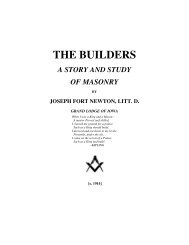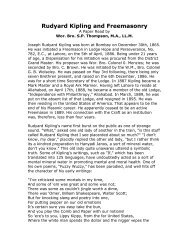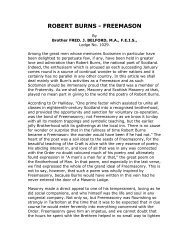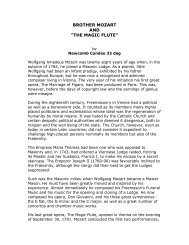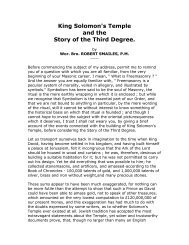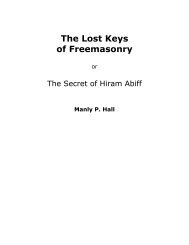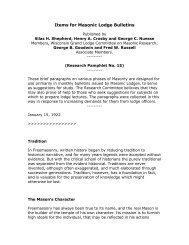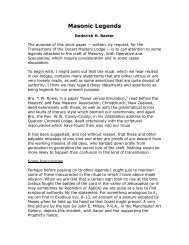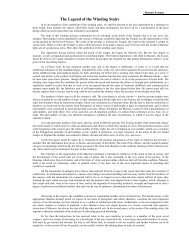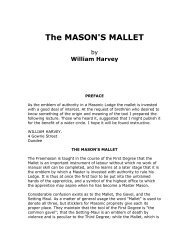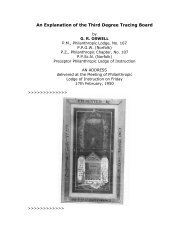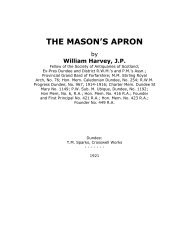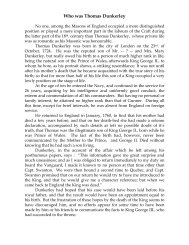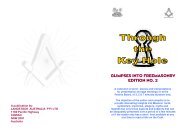The Albury MS. THE AMALGAMATED GUILD OF ... - RoseCroix.org.au
The Albury MS. THE AMALGAMATED GUILD OF ... - RoseCroix.org.au
The Albury MS. THE AMALGAMATED GUILD OF ... - RoseCroix.org.au
You also want an ePaper? Increase the reach of your titles
YUMPU automatically turns print PDFs into web optimized ePapers that Google loves.
exercise the right of free examination and of private judgment, which<br />
the principles of Protestantism professed to admit; nor was it until the<br />
18th century, some 150 years after the Reformation had c<strong>au</strong>sed to be<br />
f<strong>org</strong>otten the iron rule of Catholicism, which admits of neither, that the<br />
diestic principle fairly asserted itself. As is usual with the emancipated<br />
to misuse a newly-acquired freedom, and confound liberty with<br />
licence, many rushed into the opposite extreme and sects professing<br />
extraordinary and often irrational theories arose.<br />
Rationalism began to dawn, and its secretaries craved after an<br />
association that should set them free from dogmas, which they<br />
repudiated. <strong>The</strong> time was, however, not as yet ripe for the open<br />
profession of Deistic doctrines, and they clutched at the opportunity<br />
offered by the guilds and companies under a reformed church, to<br />
associate for these purposes. <strong>The</strong> deliberations of the guilds had been<br />
always involved in secrecy, heightened by the obligation of an oath<br />
which prohibited the divulging of the trade mysteries. None of these<br />
could have been more fitting for their purpose, or affording more<br />
suitable allegories and symbols than the united guilds of Freemasons<br />
and Masons; the more so as the secrecy incident to the meeting<br />
relieved the members from the odium attaching to a dissenting body.<br />
<strong>The</strong> unity of the Supreme Being could be asserted without the<br />
antiquated Oriental incumbrances and inconvenient rites of Judaism.<br />
<strong>The</strong> guilds, though Christian, imposed no religious test; and on the<br />
Company of Freemasons and Masons they engrafted a symbolical or<br />
speculative system by an enlargement and elaboration of existing<br />
elements and practices.<br />
<strong>The</strong> Masonic Guilds, however, offered other advantages for the<br />
foundation of such societies; they inculcated charity, relief of their<br />
poorer brethren, obedience to superiors, and a love of order. Thus to<br />
the present day, so far as the brotherhood is concerned, every<br />
member professes Deism in its most general sense, but without<br />
binding himself not to profess outside of the fraternity whatever he<br />
may choose over and above that great fundamental principle.<br />
<strong>The</strong> framework was moreover ready to hand, the principal seat of the<br />
guild was in the capital, with its branches in the principal towns. By<br />
equally insensible degrees symbolical lodges, imitated from the<br />
operative guilds, arose, unconnected with these latter, not, however,<br />
as corporate, but as voluntary societies. This origin in Deism also<br />
accounts for the inveteracy with which symbolical Masons were<br />
persecuted by the Catholic party, and for the papal belles by which



